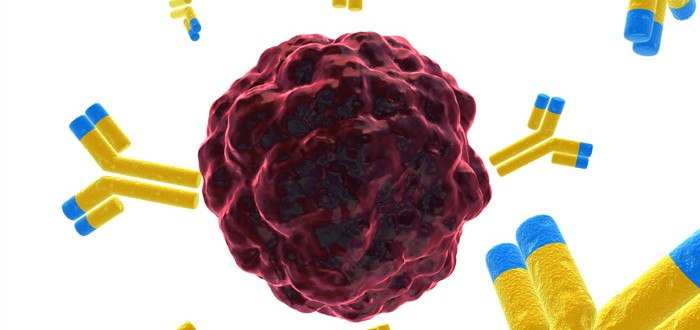Your body’s immune system let you down by allowing mesothelioma to get started and establish a foothold on the lining of your lungs, abdomen or heart.
Your immune system let you down again by not counterattacking forcefully enough to eradicate those vanguard mesothelioma cells before they could multiply and spread like wildfire.
Those failures might never have occurred had your immune system been able to summon the reinforcements it needed to mount a stronger fight.
That’s the idea behind a technology Yale University unveiled a few months ago — artificial molecules that behave just like immune-system antibodies, the agents that float around inside you to repel invaders such as bacteria, viruses and even cancer.
Yale calls these manufactured agents synthetic antibody mimics, or SyAMs.
These Yale-produced SyAMs are said to be the first of their kind that have the ability to not just identify invaders but to also take action against them, just like natural antibodies.
Mesothelioma cells were once healthy cells that mutated into cancer after decades of exposure to trapped asbestos fibers.
Once a SyAM encounters one of these mutated cells, it latches on and summons real antibodies for a massed assault.
Attack Against Mesothelioma Cells
An interesting feature of Yale’s SyAMs is that — while made up of organic compounds — they are much smaller than actual antibodies.
In fact, you could probably pack about 20 SyAMs into a single natural antibody, according to the university’s researchers.
Even so, the SyAMs that Yale synthesized could have been made even smaller than that. These, the scientists said, are actually of an intermediate size — approximately 7,000 Da.
Yale’s scientists wrote about this big breakthrough in the online Journal of the American Chemical Society.
Their SyAMs, they wrote, were designed to be given to patients by injection or orally.
The Yale scientists believe the particular size, structure and thermal stability of their artificial antibodies reduce the potential for unpleasant side effects.
Not Yet Tested on Mesothelioma
Although SyAMs are believed to be viable weaponry against all types of cancer, the Yale scientists started out by testing the product against prostate cancer.
They found that the prostate cancer-focused SyAMs were able to recognize those particular malignancies and then bind to their surfaces.
At the same time, other SyAMs latched onto nearby antibodies — the good guys in this fight — and functioned like pathfinders to guide them to the cancer cells already under attack from the other SyAMs.
The Yale scientists wrote that the pathfinder SyAMs “bind simultaneously to prostate-specific membrane antigen and Fc gamma receptor I, thus eliciting highly selective cancer cell phagocytosis.”
Translation: doom and destruction for the cancer cells.
“SyAMs have the potential to combine the advantages of both small-molecule and biologic therapies, and may address many drawbacks associated with available treatments for cancer and other diseases,” the Yale scientists wrote.
They specified that even beyond cancer, SyAMs may have applications for treating viral infections and various bacterial diseases.

